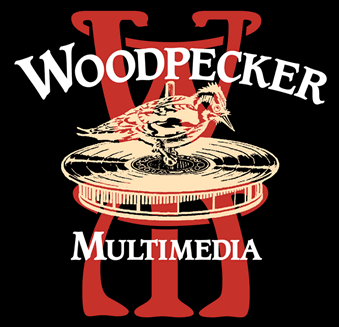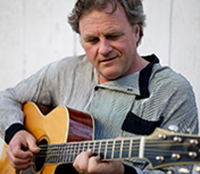|
|

This collection of songs and instrumentals includes baroque,
ragtime and Celtic solo guitar pieces, an epic ballad, a gospel
harmony song, two mandolin instrumentals, a couple of rocking
songs, some introspective art songs, an autoharp march, an almost-protest
song, an anti-love song, a love song, a country song, a vocal
duet and some folk songs. They were recorded at about 7 different
locations, including several motel rooms, my home, a cabin in
Maine, a house in New Mexico, and a tavern. All the tracks were
recorded with only a digital tape recorder and a pair of microphones,
in hopes that the music could be captured "alive" in
its natural habitat. I hate to over-season things or cook the
natural juices out. If you eat fish, then think of this as one
pulled right out of the stream and tossed into the skillet. If
not, think of a fresh ear of corn, picked from the garden when
the water was already boiling...
CREDITS
Harvey Reid: 6-string, 12-string &
slide guitars, autoharp, mandolin, bouzouki, foot, lead vocals
David Surette: Guitar on Crossing the Badlands & Maplewood
March (§)
Lynn Rothermich: Harmony vocals (*)
Moondi Klein: Guitar on Oh Marie, harmony vocal on Oh Marie
& How in This World ()
Jay Smith: Bodhran (Irish drum) on Planxty Denny
Arrangements, Production, Engineering, Mixing: Harvey Reid
Recorded at The Cottage, near Bath, Maine; at home; in
several motels, and other locations
Guitars: 1984 & 1990 (T) Taylor model 810 six strings,
early 1970's Metal-body Dobro, 1987 Taylor maple jumbo 12-string,
1992 Larrivee mahogany L5-05 (L)
Bouzouki: 1992 Trinity College model 335 octave mandolin
Mandolin: Old Gibson model F-3, borrowed from David Surette
Autoharp: 1973 Oscar Schmidt 21-chord Appalachian
Design, Type & Graphics: Aphro-Graphics
Cover Illustration: Photo by Joe Stevens
Liner Notes: Harvey Reid
Special Thanks: Dawn Richardson, Lynn Rothermich
(^) A partial capo was used Contact http://www.partialcapo.com
All selections © 1979-1993 by Harvey Reid (Quahog Music,
BMI) except Oh Marie © by Click Horning (Shine Music, BMI)
used by permission
This album was recorded in "living stereo" by the
artist, direct-to-digital, using only a matched pair of Audio-Technica
AT-4051 microphones and a Panasonic DAT digital tape recorder.
No overdubs or multi-tracking of any sort were done.
The Songs...
Oh Marie (Click Horning) (4:03) A song by a friend,
accidentally recorded when Lynn and Moondi heard me playing some
of it while exploring a new tuning, and they wanted to learn it
instead of my songs that we were supposedly working on. Sounded
so good I left it on. Moondi plays lead guitar. Tuned E-A-D-E-B-B
(^)(*)()
Missing A Train (H. Reid) (2:53) Written while driving
with cruise control somewhere in the Midwest. I had imagined this
to be a slide guitar tune, but I never could make it work any
better on guitar, so here it is with just the octave mandolin.
Sounds best cranked to distortion volume on a car stereo. Somehow
resisted the obvious temptation to record it with a rock and roll
band. Maybe I'll do a rock & roll album called Plugged.
Red In The Sky, Blood On The Water (H. Reid) (3:27) There
is a rock on an island on the coast of Maine where my mother has
made a shrine to her mother who lived 96 years and to her grand-daughter
who lived 3 weeks. This tune immediately appeared following my
introduction to that rock during a Thanksgiving Day walk with
an extremely red sunset. I think of it as a requiem, though technically
it's a slow jig. (^)
Circles (H. Reid) (4:31) Written on a drive to Albany,
New York. It lay fallow for months until I sang it in a songwriter
workshop at a festival in Ohio. Only after many people asked about
it did I realize that it was one of my most communicative songs.
Duh. Tuned Dropped-D, lowered 1, capo 2. (T)
Star Island Jig (H. Reid) (4:14) I always thought the fingerpicked
12-string had a good Celtic sound, with the double strings sounding
not unlike mandolin family instruments and hammered dulcimers.
I don't know anybody else who uses one this way. Splitting the
pairs is very tricky. Star Island is off the coast of New Hampshire,
which is about 15 miles long, unless you consider it from a fractal
geometry viewpoint, in which case it is infinitely long. (^)
Shake It Loose (H. Reid) (3:15) I hear this as a song for
a soul band with 3 horns, moustaches, matching suits, sunglasses
and possible substance abuse problems, but I just play it on the
steel bodied guitar and imagine the band. Open Eb tuning, capo
2.
Five Cent Cigar (H. Reid) (2:26) The third in my "series"
of ragtime style guitar pieces. I always loved the sound of down
home Merle Travis-style picking, though it seems to be an increasingly
lost art and no longer the cutting edge of cool it was in 1948.
Maybe it will just skip a generation. Standard tuning, C position.
(T)
Love Like Lightning (H. Reid) (4:36) For a while I thought
this song was too caustic to perform, but several people who had
presumably recently ended relationships said they liked it. Recorded
in a living room near Santa Fe. It was a demo tape for a band
to learn it and I liked it the way it was. (^)
Crossing The Badlands (H. Reid) (3:07) Written on mandolin
while driving across South Dakota, captured on film in auto-timer
photo. I drove through the badlands in an incredibly beautiful
snowstorm listening to the Lakota Nation radio station, and the
visuals have haunted me ever since. That's David Surette on guitar.
(§)
Like An Orphan Child (H. Reid) (3:18) Finished during the
recording of the project. Written to be a vocal duet, kind of
like those brother duet "mother" songs Lynn and I have
been singing for years. Sort of a prayer and a lullaby both. Capo
7, standard tuning. Recorded during a rehearsal, sounded sweet
so I kept it. (L)
Good Old Days Blues (H. Reid) (4:37) Written on the 4th
of July, 1986. A hard look back at the 60's and people who look
back at the 60's and at those who look at those who look back.
Long-dormant, it sprang to life in a motel cabin in 29 Palms,
California. (^)
Golden Rule (H. Reid) (3:11) A sort of tribute to Mississippi
John Hurt, but when I listen to the way I play it, it doesn't
really remind me of his playing all that much. Too fast. Written
in a recording studio in Portland, Maine, while waiting to do
some playing on a friend's album.
The Maplewood March (H. Reid) (3:24) An old-fashioned kind
of tune where the rhythm and melody lend themselves to the autoharp
and take advantage of some of the quirks in the instrument. Uses
a lock bar in key of C on a chromatic harp. Written on Maplewood
Avenue on an instrument made of maple wood. (§)
Waiting For The Day (H. Reid) (3:47) The first song of
my adult life, written while living in Maryland in 1979 after
I spent 7 years not writing while learning to play guitar. It
finally made it onto an album after numerous failed attempts dating
back to 1983. The golden days of driving interstate highways with
no traffic or construction are already gone forever. I-81 along
the crest of the Blue Ridge ending in Bristol, Tennessee was my
favorite, back before there were any gas stations or motels along
it. If you don't think you like country music, just drive across
the country by yourself and you'll be hooked. (L)
Once Upon A Time (H. Reid) (7:37) A creative lightning
bolt that hit me while driving down Interstate 93 in northern
NH in 1989. I had nowhere to hide and nothing to write on, and
wrote all over my calendar, almost as fast as I could write. Had
to pull off the road a couple times. It was intended to be a children's
song that would show today's video game kids with short attention
spans that the ancient art of ballads is just as effective now
as it ever has been. Have been too chicken to play it for any
kids for fear of rejection and disinterest. When I sing it to
a girl it becomes sort of an Escher drawing- a song about a dream
about a story about a song about a musician who sings a girl a
song. (^)
Planxty Denny (H. Reid) (1:42) Written in 1992 in a non-luxury
motel in New Jersey that shared a parking lot with a certain 24-hour
chain restaurant. Recorded one night after hours at the Press
Room in Portsmouth, NH with the proprietor, Jay Smith, on the
bohdran or Irish drum.
The Gray Man (H. Reid) (4:53) Accidentally written on Oct.
6 1986; I had no intention of writing any such thing. The only
song of mine that was influenced by Edgar Allan Poe. Very noir,
but I like it and it does what it was intended to do whether you
like it or not; maybe especially if not. (^) (T)
How In This World (H. Reid) (1:41) An old-fashioned gospel
harmony song I'd love to hear done by a good old-fashioned quartet
with a bass voice and a chaw of Red Man between their cheeks and
gums. ()(*)
The Unknown Soldier (H. Reid) (4:07) Written on the 6-string
banjo, and I have always thought of it as being best suited to
that instrument's sound. But I couldn't get it to sound quite
right, tried it on my new little guitar and it sounded so sweet
I left it alone. (^) (L)
©2017
|
 H
H


